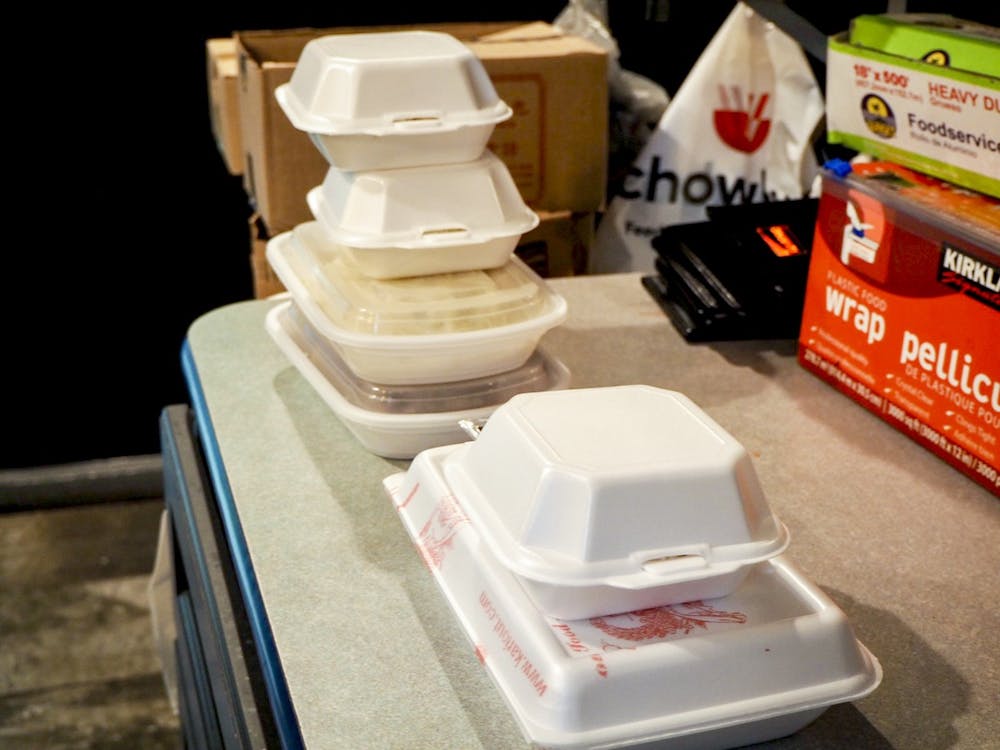The ban on polystyrene (styrofoam) food containers in Oxford restaurants went into effect on Saturday, Jan. 15. The ordinance was originally passed on Feb. 4th, 2020, but was delayed by Ohio House Bill 242.
The House Bill prohibited local governments from banning plastic bags, bottles, polystyrene containers and single-use packaging designed for transporting or consuming food until January 2022. Promoters of House Bill 242 claimed reusable containers would increase the spread of COVID-19.
City Councilors Chantel Raghu, Jason Bracken and Bill Snavely co-wrote and brought the proposal to Oxford.
“Polystyrene foam containers are really notorious for their negative impacts,” Raghu said. “Styrofoam containers are byproducts of petroleum and break down into tiny bits that release chemicals into our water system.”
The ban prohibits businesses from purchasing styrofoam for food-serving purposes and gives restaurants two years to use up their supply of styrofoam.
Raghu said the styrofoam ban builds on Oxford’s commercial composting program, which started in April 2019.
“The hope is to slowly encourage people to go toward making less trash,” Raghu said. “The ideal situation would be for people to reuse their own containers. But when that isn't possible, especially with a pandemic and people relying on takeaway so much more than eating in the restaurant, using something like a bioplastic is a good alternative.”
Assistant City Manager Jessica Greene, said for the most part, people accepted the ban and appreciated the two-year implementation time frame. A few were frustrated at what they viewed as government intervention into their private business.
“We did a fair amount of outreach before this passed in 2020,” Greene said. “[We received] mostly questions instead of anger. What we're also trying to do as a city is research if there are programs that we can apply to help businesses offset their costs to make more environmentally friendly decisions.”
Ellerbe said Council’s rush to pass the ordinance has further-reaching effects than many realize.
“If there's a developer or a business that wants to look at Oxford, regarding doing business here or creating a development here and they see how the leadership does things,” Ellerbe said, “they might not want to have to deal with that.”
Council tabled the ban in January 2020 until it was reviewed by Oxford’s environmental commission. It came back to Council in February and was approved by the environmental commission with five in favor, none against and one abstaining.
Enjoy what you're reading?
Signup for our newsletter
The environmental commission shared concerns over how quickly Council tried to pass the ordinance, though.
Ellerbe has been working to create a plan that softens the economic transition for businesses to purchase more expensive sustainable products. He hopes to use some of the federal Coronavirus Aid, Relief, and Economic Security (CARES) Act funding to provide businesses with non-styrofoam takeout containers.
“Typically, nonprofits and governmental agencies can get better rates, especially if they buy in very large bulk and be able to pass those savings on to our businesses to alleviate those price increases they now might have to do,” Ellerbe said. “I don't know if it's going to actually happen or not, but that's something that I'm definitely gonna push to make happen.”
Currently, Skippers Pub and Topdeck, Skyline Chili, and Krishna all use polystyrene containers.
Skippers owner Andrew Emory said he is currently doing his diligence by researching alternatives to styrofoam that will be best for customers, economically and for the environment.
Skyline is currently talking to a buyer to help make the switch. Manager Chris Jones said the ban will shift how the restaurant handles carryout and are appreciative of City Council reaching out to help with the transition.
Krishna owner Resham Bassi said decreased business, which had become mostly carryout during the pandemic, would suffer without the use of styrofoam carryout containers. Krishna has not been in contact with City Council about assistance with transitioning.
“I know I didn't get any people,” Bassi said. “[Oxford officials] didn't say anything about how they're going to help.”
Raghu said she hopes this ordinance will encourage Oxford citizens to learn more about ways they can reduce harm to the environment.
“I think the most beautiful thing is the education part of it, because there's a lot of people that until this came out, that didn't realize that polystyrene was bad,” Raghu said. “This is helping educate people to think, ‘Oh, there might be alternatives out there that are better for the environment, maybe better for my health.”




